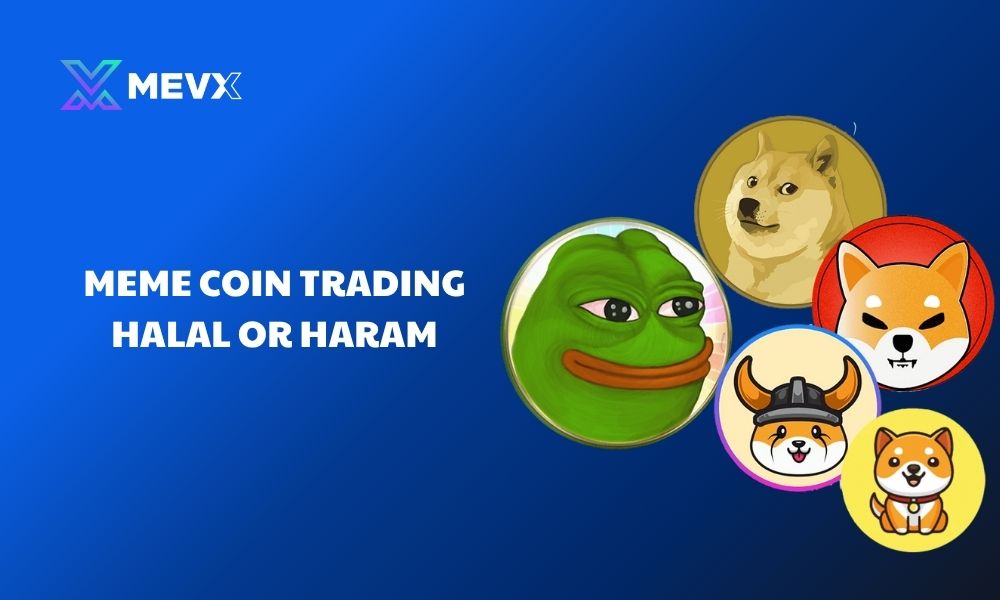Meme coin trading Halal or Haram is a crucial question among Muslim communities as the crypto market—especially meme coins—continues to expand. Determining whether this activity aligns with Islamic Shariah law has sparked various debates among scholars and investors.
What are meme coins and why are they so attractive?
Meme coins are cryptocurrencies inspired by internet culture, jokes, or viral trends. Coins like Dogecoin, Shiba Inu, and Pepe are not typically backed by strong utility or blockchain innovation but rather driven by hype and speculation. Their potential for rapid price increases has made them popular among risk-tolerant investors.
However, due to their speculative nature and lack of intrinsic value, meme coins raise ethical and financial concerns, especially when viewed through an Islamic lens. This makes the question meme coin trading Halal or Haram even more relevant in today’s market.
Criteria for determining Halal or Haram in financial activities
In Islam, financial transactions must meet specific Shariah principles to be considered halal (permissible):
- No involvement in riba (interest).
- Avoidance of maysir (excessive gambling/speculation).
- Absence of gharar (ambiguity or uncertainty).
- No links to industries prohibited by Islam (e.g., alcohol, gambling, weapons).
Using these principles, we can begin to explore whether meme coin trading Halal or Haram is a fair or forbidden activity.

Analyzing meme coins through the lens of Shariah
Maysir – speculative nature
Meme coin investments are often based on hype, not fundamental analysis. This resembles gambling, which is strictly forbidden in Islam. Many scholars believe this makes meme coin trading more likely to be haram. This argument is central to the meme coin trading Halal or Haram debate.
Gharar – ambiguity and lack of transparency
Many meme coins lack clear whitepapers, development roadmaps, or verifiable teams. This uncertainty introduces gharar, which is also prohibited in Islam. The vague and risky nature of these projects leads many scholars to caution against them.
Riba – not a direct factor
Meme coin transactions typically don’t involve interest directly. However, if someone borrows money with interest to invest in meme coins, that transaction becomes problematic. While riba isn’t a core issue in the meme coin trading Halal or Haram discussion, it can indirectly apply.
Scholarly views on meme coin trading Halal or Haram
Some Islamic scholars believe all high-risk and speculative trading is haram, especially when it mimics gambling behavior. Others adopt a more nuanced view, suggesting that responsible, informed investment without debt or reckless risk may be acceptable under specific circumstances.
Still, no definitive consensus exists. The diversity of opinion highlights how complex meme coin trading Halal or Haram is, and it often comes down to individual context and intent.
Why meme coin trading is risky beyond religion
Even without considering Shariah law, meme coin trading is inherently risky:
- Easily manipulated by “whales” or influencers.
- Lacks utility or real-world application.
- Vulnerable to “rug pulls” and exit scams.
- Extreme price volatility with little predictability.
So, whether or not you are concerned about religious rulings, meme coin trading Halal or Haram is a relevant question for all investors due to its high-risk nature.
How to invest ethically in crypto as a Muslim
If you want to participate in the crypto space while respecting Islamic principles, consider the following:
- Research coins that offer clear utility and are backed by credible teams.
- Avoid coins purely driven by social media hype or trends.
- Never borrow money with interest for investing purposes.
- Only invest what you can afford to lose, without financial strain.
By applying these ethical filters, Muslim investors can approach the market with greater responsibility and alignment with their values, keeping the meme coin trading Halal or Haram question in focus.
So, is meme coin trading Halal or Haram? While no universal answer exists, most Shariah scholars agree that the high levels of speculation and uncertainty lean this activity toward being haram. As a Muslim investor, it’s essential to reflect on your intention, consult religious authorities, and proceed with knowledge and caution.
